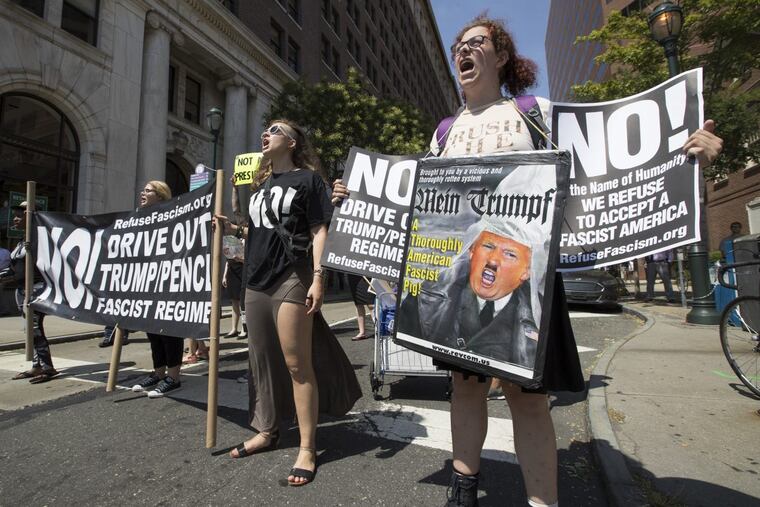Undocumented? Illegal? Alien? The fight over the words of immigration
The debate over the language of immigration has sharpened in the last two years, largely driven by Donald Trump, who as a candidate and as president has described border-crossers as "illegals" and "illegal aliens" who foment "illegal immigration" to the United States.

During a court hearing over Philadelphia's conduct as a sanctuary city, Justice Department lawyer Arjun Garg rarely veered from applying a two-word label to the people at the heart of the case — "illegal aliens."
Philadelphia City Solicitor Sozi Tulante, standing six feet away in the same federal courtroom, never uttered those words.
"If you're here without documents, you hear all that comes with it," he said. "We're very intentional about how we refer to people."
Tulante leads the city's fight against the Trump administration's effort to withhold law-enforcement grant money from sanctuary cities. In court, he spoke of "residents" and "citizens" who might not have the necessary papers to be in this country.
These days, the terminology around immigrants — undocumented, illegal, unauthorized, unlawful, alien — has become as divisive as immigration itself. There's little consensus on what to call a populace estimated at more than 11 million. Different people and groups use different terms, and accuse each other of deliberately choosing words that are too soft or too harsh.
"The language itself becomes part of the argument, part of the battle," said David Spener, author of Clandestine Crossings: Migrants and Coyotes on the Texas-Mexico Border, and chair of the sociology and anthropology department at Trinity University in San Antonio, Texas.
Spener prefers "migrants" because it implies long-term travel in different directions, including circles, as opposed to the straight, one-way trip indicated by "immigrants."
He has considered "autonomous migrants," people who move without government permission because they're focused on their families' needs, and "unprotected migrants," since the lack of official approval can put them at the mercy of traffickers.
The debate has sharpened during the last two years, largely driven by Donald Trump, who as a candidate and as president has described border-crossers as "illegals" and "illegal aliens" who foment "illegal immigration" to the United States.
"You know the illegals," Trump told a conference of police chiefs in February. "You know them by their first name. You know them by their nicknames. You're in the neighborhoods. You know the bad ones, you know the good ones. I want you to turn in the bad ones."
The city sued Attorney General Jeff Sessions in August over the administration's plan to withhold money from sanctuary cities, which limit their cooperation with federal immigration authorities.
Last week, outside U.S. District Court in Center City where the case was being heard, Justice Department attorney Garg declined to say why he chose "illegal aliens" as the correct term. But some conservative thinkers argue that phrase is exactly accurate, used in legal opinions and in reports by the Department of Homeland Security.
"The correct term is 'illegal alien,' " Hans von Spakovsky wrote in the conservative magazine National Review. "The politically correct term 'undocumented immigrant' … is a made-up term used by progressive groups and media sources to extinguish the line between legal immigrants and illegal aliens."
For others, the phrase provokes a visceral reaction.
"I'm a human being," said Maria Sotomayor, who immigrated from Ecuador and is now deputy director of the Pennsylvania Immigration and Citizenship Coalition, an advocacy group. "A human being is not a crime."
Nobel Peace Prize winner Elie Wiesel famously said that no human can be illegal. Pope Francis refers to "migrants" and "refugees" and "our brothers and sisters." And last year, the Library of Congress dropped "illegal alien" from its subject headings — angering conservative lawmakers who claimed the library had bowed to liberal pressure.
There's been a push to uncouple "illegal" from immigration by groups like Race Forward, which runs a campaign called "Drop the I-Word." They argue that "illegal" is never applied to white immigrants, that it encourages hate crimes, and lacks legal and journalistic accuracy.
"It's dehumanizing," said Jasmine Rivera, a Philadelphia activist and the daughter of Mexican immigrants. "Folks are always afraid of 'the other,' and by using language to place a name on who is 'the other,' you stop looking at people as human beings."
Being in the United States without authorization is a civil violation, not a criminal offense.
Kevin Fandl, a former counsel to U.S. Immigration and Customs Enforcement, known as ICE, points out that drug dealers and other criminals are never identified as "illegals."
The Temple University legal-studies scholar prefers "unlawful immigrants," to mean people who are present without legal authority. The word "undocumented" is imperfect, Fandl said, because many people have documents, just not the correct ones.
The Associated Press eliminated "illegal immigrant" from its reports in 2013, saying "illegal" should describe an action, not a person. The Inquirer stylebook says no to the use of "aliens" and strongly discourages the term "illegal immigrant."
Never, the stylebook warns reporters and editors, use "unauthorized immigrant" — the phrase chosen as accurate by the Pew Research Center in a revealing 2017 study on immigration. The center estimated the U.S. is home to 11.3 million undocumented immigrants, about half of them Mexican.
"Words are laden always with connotations," said Spener, the Trinity University sociologist. "To be an 'illegal immigrant' or 'illegal alien' is not about having committed an illegal act — it's a status. … You cross the border, but the border envelops you even in U.S. territory."